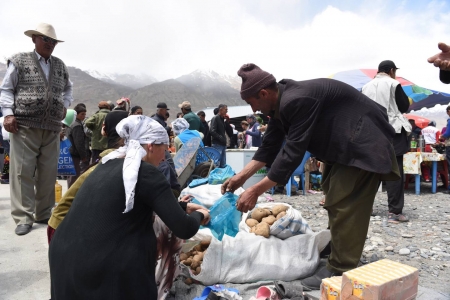Aga Khan Foundation gets UK government funding for programmes in crisis-hit Afghanistan 2022-11-07
The Aga Khan Foundation and the UK government have partnered to deliver a number of agriculture, healthcare and livelihood projects in Afghanistan.
The £11.2 million grant from UK aid will support AKF’s efforts to help Afghans move beyond immediate humanitarian relief and help communities in the struggling country rebuild, the organisation said.
After decades of conflict and last year’s return to Taliban rule, which led to the US freezing of $3.5 billion of funds in the Afghan central bank reserves, Afghanistan is in the grips of an “unprecedented humanitarian crisis”, the United Nations said.
A severe economic situation, high levels of poverty, natural disasters and the aftermath of the Covid-19 pandemic have left about 24.4 million people — 59 per cent of Afghanistan’s estimated 42 million population — in need of humanitarian and protection assistance.
Following a 12-day visit to the country in October, the UN special rapporteur on the situation of human rights in Afghanistan Richard Bennett called for “urgent action” to avert further deterioration.
With winter approaching, a number of relief agencies have expressed concerns over the fate of millions of poverty-stricken people in Afghanistan. The UN’s humanitarian response plan estimates that a total $4.4bn in aid is needed, but its own figures say only $1.9 billion has been received by donors so far.
Kendra Schreiner, partnerships manager at the AKF UK said sanctions and the freezing of aid, which used to account for 75 per cent of the Afghan government’s spending, had led to severe education funding cuts and affected around 10 million children.
“These factors have left rural communities with an even greater lack of resources, access to services, and capacity to cope with further shocks,” wrote Ms Schreiner about the new programme in a blog post.
“The impact on the quality of life has been enormous.”
AKF says it will use the funds to address gaps in the provision of education and health services and provide both on and off-farm livelihood support, reaching over 800,000 people across nine provinces.
Dr Najmuddin Najm, CEO of AKF Afghanistan, told The National that while he recognised the “many immediate needs around food, water, and healthcare”, the organisation wanted to focus on “doing more today to prevent a greater humanitarian crisis tomorrow”.
“We are also focused on things that will help communities absorb the shocks of the current situation and build their resilience — things like livelihoods and jobs, providing feed and fodder for livestock that support families, ensuring adequate seeds, fertiliser and other inputs for farmers and of course maintaining critical services in health and education,” said Dr Najm.
Global economic crises and concerns over funding the Taliban has lessened the in-flow of international aid to Afghanistan.
But the AKF says its decades-long presence in the country and “strict political neutrality” has allowed it to continue operating.
“We have always worked closely with and on behalf of the Afghan people, maintaining strict political neutrality,” Dr Najm said.
“Because we are so deeply rooted at the community level, the people themselves have ensured we can continue to do our work.
“They make sure the authorities know that we understand the local needs, that we listen and act impartially, that we are bringing vital services to everyone in need regardless of background or affiliation.
“That has allowed us to continue all our operations and even to expand them.”
Education, a sensitive issue in a country that has effectively banned learning for girls beyond primary school, is a main area of focus for the non-governmental organisation.
AKF says it will use the UK grant money to improve access to learning opportunities for primary-aged children, including 5,000 girls and 3,000 boys, through community-based approaches. The NGO also plans to provide catch-up classes for 15,000 girls and 10,000 boys.
Immunisations and maternal and child health will be the main areas of focus under the organisation’s healthcare provisions, with mobile and remote services expected to reach over 23,000 children and 35,000 women.
AKF will also provide psychological support services for Afghans suffering from trauma.
Recognising the “heightened restrictions” on women’s mobility and employment in Afghanistan, AKF says it wants to support opportunities in home-based, income-generating activities and micro enterprises, like farming and women-run processing centres.
“AKF is working to build the resilience of vulnerable Afghan communities so that they are better equipped to respond to the evolving nature of this crisis,” said Ms Schreiner.
- 486 reads
 Ismaili.NET - Heritage F.I.E.L.D.
Ismaili.NET - Heritage F.I.E.L.D.